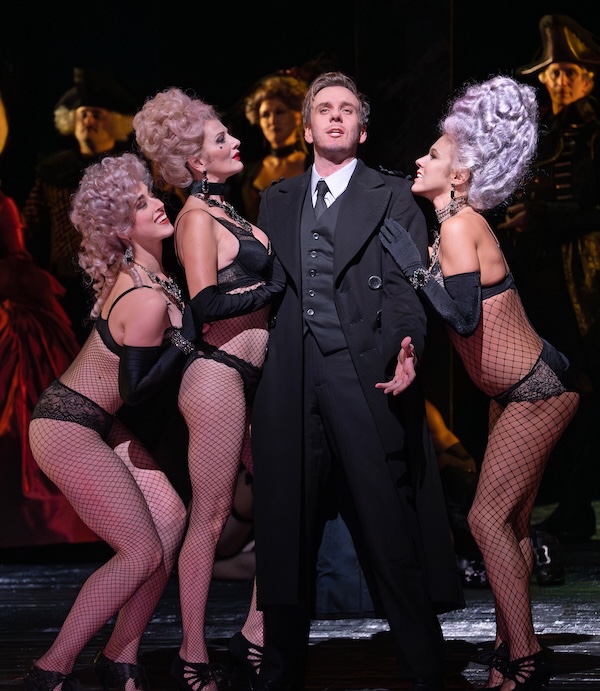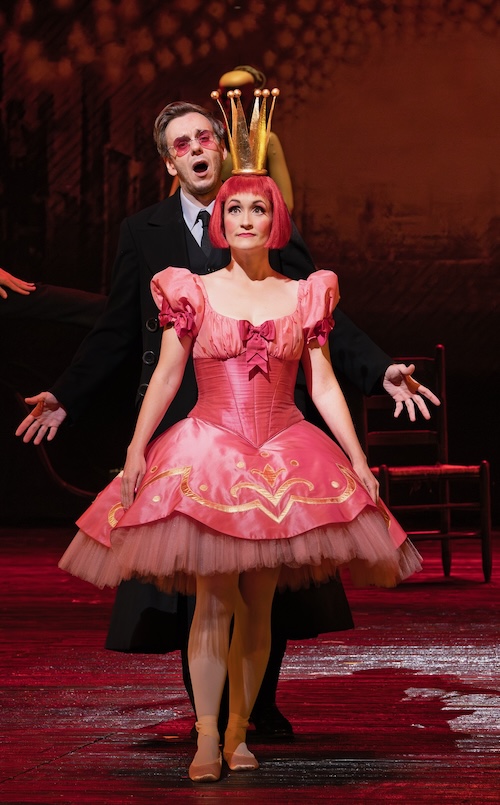Met’s “Tales of Hoffmann” offers dark Romanticism and a feast of female voices

E.T.A. Hoffmann, spinner of bizarre tales in the early Romantic era, is remembered today less for his own writings than for his influence on the likes of Hawthorne, Poe, and the young Robert Schumann. And—Jacques Offenbach?
Ever since seeing the play Les Contes d’Hoffmann, concocted from the writer’s stories by Jules Barbier and Michel Carré, the composer of fizzy entertainments such as Orphée aux enfers and La belle Hélène felt he had a dark Hoffmann opera in him.
The resulting work, left unfinished at Offenbach’s death and fleshed out by later composers and scholars, received the sumptuous Metropolitan Opera treatment, both vocally and scenically, at Saturday afternoon’s matinée performance of Bartlett Sher’s production, directed by Gina Lapinski.
The spotlight, both figuratively and literally in James F. Ingalls’ lighting design, was on the opera’s three arresting soprano roles, here one for each tale: the animated doll Olympia in Act I, the doomed singer Antonia in Act II, and the seductive courtesan Giulietta in Act III.
Citing the play’s implication that the three roles are different aspects of one character, sopranos such as Sutherland and Sills have carried off all three in one tour de force performance. The current production, however, showcases the immense and distinctive talents of Erin Morley, Pretty Yende and Clémentine Margaine in the respective roles.
The unifying device of the play and opera is the character of Hoffmann himself, who not only spins his tales to an unruly tavern audience, but stars as the disappointed lover in each of them. The role is a challenge to bring off, carrying the show in one sense, yet more acted on than acting vis-à-vis his dazzling, unattainable lovers.
Romantic tenors from Gedda and Domingo to Alagna have sought a vehicle in Hoffmann, but Saturday found Benjamin Bernheim in the shadow of his female co-stars, story-wise and vocally. He certainly looked every inch the sensitive, suffering poet, and his voice, well-placed and uniform throughout his range, supported a fine, well-acted performance.
The art of coloratura singing is usually in expressing human emotion with it, so that it doesn’t sound like a mechanical stunt. Offenbach’s Olympia, however, is literally a mechanical creature, and soprano Morley was in full stunt mode Saturday, executing seemingly superhuman, stratospheric leaps and spins while jerking her arms and legs like, well, a wind-up doll.
A dazzler for sure, and yet one couldn’t help thinking, what if Olympia were (as in Hoffmann’s original story) believably human but just a little “off,” so that Hoffmann, and the audience, could credibly fall in love with her? Well, that’s for another production.

The undertone of Gothic horror in Act I bloomed forth in Act II, as the failing heroine Antonia, overprotected by her father Crespel and manipulated by the cunning fraud Doctor Miracle, was forbidden to sing for reasons of health. But this is opera, so…the result was predictable, but no less devastating for Crespel and her would-be lover Hoffmann. Pretty Yende’s warm tone and floating pianissimos captured the character’s vulnerability and longing for beauty as death closed in.
Act III found the earnest northerner Hoffmann at first scorning the frivolity and sensuality of Venice, then succumbing to the charms of the glamorous Giulietta, who conspires with the sinister Dapertutto to steal Hoffman’s reflection (i.e., his soul). Under their malign influence, Hoffman kills his rival lover in a duel, but is discarded by Giulietta anyway.
Mezzo-soprano Margaine’s powerful, room-filling voice as Giulietta was a splendid thing to behold, although the role perhaps needed less stand-back and more come-hither.
If the female leads might be aspects of one character, all the opera’s agents of doom can certainly be rolled into one villain, in this case bass-baritone Christian Van Horn swirling through the scenes in a long black cloak as not only Doctor Miracle and Dapertutto, but as Hoffmann’s love rival Lindorf in the Prologue and the greedy schemer Coppélius in Act I.
Managing his rugged voice well for the long performance, Van Horn kept his vocalization appropriately veiled and devious most of the time, rising as necessary to a rough-edged, intimidating roar.
Mezzo-soprano Vasilisa Berzhanskaya was onstage for most of the opera, in a flowing dress as Hoffmann’s poetic Muse during the Prologue and Epilogue, but mostly in a suit and top hat as his friend and sidekick Nicklausse, occasionally involved in the action, usually observing it from afar, as if helping the poet process it.
Berzhanskaya’s voice topped out with ease, and if there was some pushing in the low register, it could have been part of the woman-as-man characterization. Her duet with Margaine in Act III, gently introducing the opera’s famous, swaying Barcarolle, was a mellifluous beauty, setting the sensuous Venetian scene.
Baritone Bradley Garvin was a sturdy everyman as the tavernkeeper Luther and Antonia’s anguished father. Baritone Jeongcheol Cha as the appropriately named Schlémil was vocally strong through his seduction by Giulietta and his skewering by Hoffman.
Tenor Aaron Blake’s four-in-one jittery clown/servant characters seemed jarring and overdone, but he did get in a few zingers satirizing opera singing.
Autumnal-voiced soprano Eve Gigliotti enhanced Act II’s tragic climax as the vision of Antonia’s dead mother, entreating the girl to sing.
Conductor Marco Armiliato’s unerring sense of pace drove the fantastic doll scene, swooned with Antonia’s halting phrases, and buoyed the barcarolle in all its seductive guises.
Michael Yeargan’s sets embodied each act’s psychological world: mad-scientist fantastical and obsessed with eyes in the doll-maker’s workshop, bleak and bare in Antonia’s lonely existence, gilded and enticing in the Venetian palazzo. Choreographer Dou Dou Huang did likewise with sexy dancers in the shop and Venice, and steered Tilman Michael’s chorus as it sang a vigorous drinking song or cooed consolation to the suffering poet.
As the audience emerged into a rainy plaza, Lincoln Center became the Valley of the Dolls as the Koch Theater disgorged the spectators of Delibes’s Coppélia, a ballet based on the same story as Act I of the opera. One imagines the real-life impecunious poet E.T.A. Hoffmann would be gobsmacked at ruling New York’s artistic roost, if only for an afternoon.
Les Contes d’Hoffman runs through October 18. metopera.org